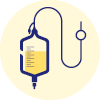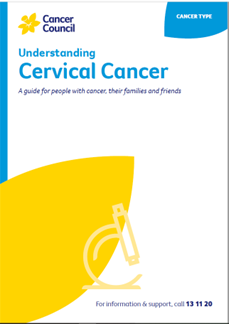- Home
- Cervical cancer
- Treatment
- Surgery
- What to expect after surgery
What to expect after surgery
When you wake up from surgery, you will be in a recovery room near the operating theatre. Once you are fully conscious, you will be taken to your bed on the hospital ward.
 | Tubes and dripsYou may have an intravenous (IV) drip to give you fluid and medicine (such as pain medicine or antibiotics to prevent infection), a tube in your abdomen to drain fluid from the operation site, and a small plastic tube (catheter) in your bladder to drain urine (wee). These tubes will be removed before you go home.After the catheter is removed from your bladder, the nurses will check that your bladder is emptying properly. This is called a bladder scan. It is a quick, painless scan that is done on the hospital ward. |
 | Pain and discomfortAfter a major operation, it is common to feel some pain. You will be given pain medicine as a tablet (orally), through a drip (intravenously) or through a catheter inserted in the spaces in the spine (epidural). If you still have pain, let your doctor or nurse know so they can change your medicine to one that provides more relief. |
 | Blood clot preventionYou will usually have injections of a blood-thinning drug to reduce the risk of blood clots. While you are in bed, you may have to wear compression stockings on your lower legs. These stockings help the blood in your legs circulate and prevent blood clots forming in the deep veins of the legs or pelvis (deep vein thrombosis). You will be encouraged to walk around as soon as you can and you may be asked to continue injecting blood-thinning drugs for several weeks after returning home. |
 | RecoveryYou will usually spend up to 5 days in hospital after surgery. The recovery time depends on the type of surgery, your fitness and whether you have any complications. You will be able to go home when the treatment team is satisfied with your recovery and the results of your bladder scans. |
For more on this, see our general section on Surgery.
→ READ MORE: Side effects of surgery
Podcast: Making Treatment Decisions
Listen to more of our podcast for people affected by cancer
More resources
Prof Martin Oehler, Director of Gynaecological Oncology, Royal Adelaide Hospital, and Clinical Professor, University of Adelaide, SA; Dawn Bedwell, 13 11 20 Consultant, Cancer Council QLD; Gemma Busuttil, Radiation Therapist, Crown Princess Mary Cancer Centre, Westmead Hospital, NSW; Dr Antonia Jones, Gynaecological Oncologist, The Royal Women’s Hospital and Mercy Hospital for Women, VIC; Angela Keating, Senior Psychologist, Royal Hospital for Women, NSW; Anne Mellon, Clinical Nurse Consultant – Gynaecological Oncology, Hunter New England Centre for Gynaecological Cancer, NSW; Dr Inger Olesen, Medical Oncologist, Andrew Love Cancer Centre, Barwon Health, Geelong, VIC; Dr Serena Sia, Radiation Oncologist, Fiona Stanley Hospital and King Edward Memorial Hospital, WA; A/Prof Megan Smith, Co-lead, Cervical Cancer and HPV Stream, The Daffodil Centre, Cancer Council NSW and The University of Sydney, NSW; Emily Stevens, Gynaecology Oncology Nurse Coordinator, Southern Adelaide Local Health Network, Flinders Medical Centre, SA; Melissa Whalen, Consumer.
View the Cancer Council NSW editorial policy.
View all publications or call 13 11 20 for free printed copies.

